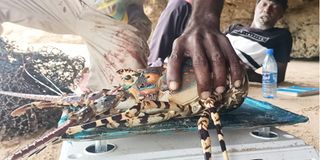It’s a dog's life for Tana's lobster fishermen as climate change wreaks havoc

A lobster fisherman weighs his catch at the Kipini landing site in Tana River County.
The fall in the catch of lobster is driving the fishermen in Kipini, Tana River County, into abject poverty.
The fishermen are blaming this on the changing climatic conditions at sea, which they have no control over, as well as foreign fishing vessels, that have made the once-lucrative business non-profitable.
In a good season, Iqbal Mohammed would catch 250 kilogrammes of lobster daily, but today, he barely gets 60 kilogrammes.
"Sometimes the water at sea gets cold and that affects the lobster catch because they love warm waters. We have to wait until it gets warm or we sail elsewhere with favourable temperatures, which is a gamble," Mohamed says.
Whereas a single boat at sea would bring back more than 50 kilos of high-quality lobsters, each lobster weighing as much as 2.3 kilogrammes, today only two out of five boats will return with a catch, weighing less than a combined 35 kilos.
The quality of the lobsters has also gone down. A kilo of good lobster sold at Sh4,000 but that has plummeted to Sh2,500.
At the landing site, Mohamed has 63 kilos, yet his clients have placed orders for 150 kilogrammes.
"Every day at sea costs me a lot and it breaks my heart to send a boat at sea only for it to return with nothing and at worst, more losses," he said.
The fuel cost is also high and the trawlers at sea are a nuisance to the small fishermen as they destroy their nets and cages.
Of every 10 boats that go to the sea, four lose their nets, and cages to the trawler ships, a painful ordeal for the fishermen.
"These nets are very expensive; they cost nearly Sh200,000, and once you invest that much only to lose it before you even get half the money you used, you feel like going mad," Sadiq Shehe laments.
However, that is not the only challenge the lobster fishermen in Kipini face.
Some of the security officials of the Coast Guard, they claim, extort money from boats in demand for specific coxswains.
According to the fishermen, their expertise is passed down from their forefathers, who depended on the moon and the wind, however, they have tried to employ coxswains they can afford.
"What they are demanding from us goes for as much as Sh80,000 and with our catch, we can't afford that. They have become the agents of the trawler ships to deny us a hustle at sea," adds Shehe.
With such a burden weighing down the fishermen, the boats at sea have to cut costs and the measures are affecting livelihoods.
Ali Nadhif was on deck on Kipini Jambo Boat and now is among hundreds who have been dropped from more than 50 boats that go to the sea, in cost-cutting measures.
Each day he waits at the landing site to collect bycatch from his colleagues to feed his family. At times, there is nothing to take home.
"I see how it affects him and how he tries to fight depression. As his wife, I do the best I can to comfort him, but also as the wives of these fishermen, we are working on a solution," says Nadhif’s wife Rukia Salim.
The Kipini Fisherwives Movement is engaging the Beach Management Unit to organise shifts for their husbands working on deck so that each can earn a living.
According to the women, half a loaf is better than none, and a split in the daily earnings for each member will be a solution for sanity's sake.
"When you create 100 jobless people in a day, then you are likely to create 100 criminals and twice the number of school dropouts because children and families depend on these people. We must all find a way to coexist in this harsh moment," said Mwanaharusi Mohammed, the Kipini Fish Mongers Chairperson.
Kipini Beach Management Unit Chairman Omar Mohammed notes that the fishermen in Kipini are a disadvantaged lot.
He says the Kipini Indian Ocean strip is the breeding ground for most prawns, lobsters and crabs.
The lobster dealers decry punitive revenues by the county administration, denying them gain from their hard work.
"The county levy charged for a kilo of crab is about Sh900, yet the revenue on beef is Sh150. You can see how outrageous these charges are and the department does not care provided they reap," Mohamed says.
Also, he decries the destruction of breeding sites for special fish and turtles by the trawlers, noting that it is depleting the sites hence the fall in the catch.
The efforts to arrest the ship operators have not yielded any fruits, because many are shielded by top government officials.
"We confiscated a ship with more than three tonnes of bycatch here. We detained it, only for it to be released via a court order, and the case died mysteriously," said Awadh Mbarak, the secretary-general of Kipini BMU.
As poverty continues to ravage many families, fishermen like Mohammed rely on their small lobster farms and have scaled down the number of suppliers to meet demand.
Others who do not have cage farms sit at the landing site hoping for a better day.





